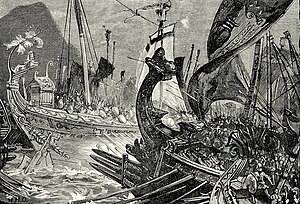| Battle of Salamis | |||||||||
|---|---|---|---|---|---|---|---|---|---|
| Part of the Wars of the Diadochi | |||||||||
 19th-century depiction of the battle between Ptolemy and Demetrius Poliorcetes off Salamis. | |||||||||
| |||||||||
| Belligerents | |||||||||
|
Antigonids Athens | Ptolemies | ||||||||
| Commanders and leaders | |||||||||
|
Demetrius Poliorcetes Medius of Larissa |
Ptolemy Menelaus (POW) | ||||||||
| Strength | |||||||||
| c. 180 warships (30 Athenian) |
60 warships (Menelaus) 140 warships & 200 transports (Ptolemy) | ||||||||
| Casualties and losses | |||||||||
| 20 warships damaged |
80 warships lost 40 warships and 100 transports captured Menelaus' force surrenders | ||||||||
Location of the naval battle of Salamis | |||||||||
The naval Battle of Salamis in 306 BC took place off Salamis, Cyprus between the fleets of Ptolemy I of Egypt and Antigonus I Monophthalmus, two of the Diadochi, the generals who, after the death of Alexander the Great, fought each other for control of his empire.
Cyprus had been seized by Ptolemy, and was used as a base for operations against the Antigonid territories in Asia Minor and the Levant. In 306 BC, Antigonus sent his son Demetrius to invade the island, which was defended by Ptolemy's brother Menelaus. After landing on the northeastern part of the island, Demetrius marched to Salamis, defeated Menelaus in a battle, and laid siege to the city. This was the first time where Demetrius demonstrated his flair for siege warfare, which would later earn him the sobriquet Poliorcetes, "the Besieger". Nevertheless, Menelaus was able to hold off Demetrius' attacks until the arrival of reinforcements. Ptolemy led a large-scale rescue expedition in person, hoping to catch Demetrius between his own forces and those of Menelaus, sallying forth from Salamis. Demetrius took a calculated risk by leaving only a small force to impede Menelaus, and focusing the bulk of his forces against Ptolemy. The ensuing battle was a complete victory for Demetrius, who destroyed or captured much of Ptolemy's fleet and army. After the battle, Menelaus and his men surrendered, and the rest of Cyprus was captured by Demetrius. In the wake of this victory, Antigonus assumed the royal title that had been vacant since the murder of Alexander's underage son. This act influenced the other Diadochi to follow and imitate Antigonus and Demetrius. Quickly after the battle, most Diadochi had officially assumed the kingship.
The battle was a turning point in the Diadochic Wars and placed the Antigonids in a position of supremacy in the emerging Hellenistic world. In addition, the adoption of the royal title had a lasting impact on the Hellenistic period.
